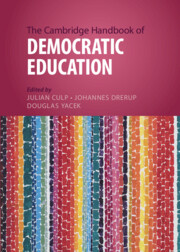Book contents
- The Cambridge Handbook of Democratic Education
- Cambridge Handbooks in Education
- The Cambridge Handbook of Democratic Education
- Copyright page
- Contents
- Contributors
- Acknowledgments
- Introduction
- Part One Historical Perspectives
- Part Two Philosophical and Normative Foundations
- 9 Normative Case Studies as Democratic Education
- 10 Moral Education and Democratic Education
- 11 Rawlsian Political Liberalism and Democratic Education
- 12 Social Justice Education and Democratic Legitimacy
- 13 Critical Theory, Local Moral Perception, and Democratic Education
- 14 Democratic Deliberation in the Absence of Integration
- 15 Education and Democratic Citizenship: Capabilities and Quality Education
- Part Three Key Topics and Concepts
- Part Four Challenges
- Index
- References
9 - Normative Case Studies as Democratic Education
from Part Two - Philosophical and Normative Foundations
Published online by Cambridge University Press: 20 April 2023
- The Cambridge Handbook of Democratic Education
- Cambridge Handbooks in Education
- The Cambridge Handbook of Democratic Education
- Copyright page
- Contents
- Contributors
- Acknowledgments
- Introduction
- Part One Historical Perspectives
- Part Two Philosophical and Normative Foundations
- 9 Normative Case Studies as Democratic Education
- 10 Moral Education and Democratic Education
- 11 Rawlsian Political Liberalism and Democratic Education
- 12 Social Justice Education and Democratic Legitimacy
- 13 Critical Theory, Local Moral Perception, and Democratic Education
- 14 Democratic Deliberation in the Absence of Integration
- 15 Education and Democratic Citizenship: Capabilities and Quality Education
- Part Three Key Topics and Concepts
- Part Four Challenges
- Index
- References
Summary
Education professionals regularly confront challenging ethical questions in the course of their work. Recently, education scholars and practitioners have embraced normative case studies – realistic accounts of the complex ethical dilemmas of educational practice and policy – as a key tool both for theorizing the ethical dimension of education work and for supporting the development of education professionals as moral agents. This chapter zooms in on the second, pedagogical aim of the normative case study and makes the case that this approach to professional education is best understood as a form of democratic education. Through careful facilitation and a structured discussion protocol, the normative case study approach: (i) allows participants to discuss ethical dilemmas that arise in their work in relations of democratic equality, fostering their development of moral sensitivity and moral agency; and (ii) supports participants in learning to sustain dialogue across reasonable disagreement.
Keywords
- Type
- Chapter
- Information
- The Cambridge Handbook of Democratic Education , pp. 129 - 145Publisher: Cambridge University PressPrint publication year: 2023



